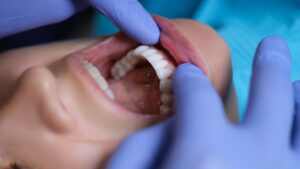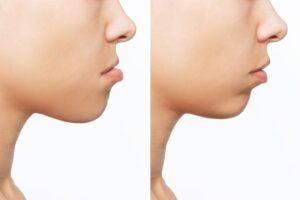-
The Role of Probiotics in Improving Oral Health

When you think of probiotics, yogurt and gut health probably come to mind. But did you know these friendly bacteria are also good for oral health? It’s true—probiotics play a part in maintaining a healthy mouth. Explore how these microorganisms keep your smile bright and freshen your breath. Continue reading “The Role of Probiotics in Improving Oral Health”
-
What Causes Tooth Sensitivity and How to Manage It

Have you ever taken a sip of ice-cold water and felt an unexpected jolt in your teeth? You’re not alone. Tooth sensitivity is a common issue that makes eating, drinking, and even breathing cold air uncomfortable. Most people describe it as a sharp, temporary pain in one or more teeth when exposed to hot or cold temperatures, sweet or acidic foods and drinks, and even pressure from brushing and flossing. Learning what causes tooth sensitivity is the first step toward managing it effectively. Continue reading “What Causes Tooth Sensitivity and How to Manage It”
-
Why You Shouldn’t Ignore Dry Mouth Symptoms

It’s normal for your mouth to feel dry occasionally, such as when you’re dehydrated or nervous, but it shouldn’t feel dry all this time. Chronic dry mouth, or xerostomia, is more than a minor annoyance. It could signal a deeper underlying problem requiring your attention. Plus, it makes you more vulnerable to dental problems. Continue reading “Why You Shouldn’t Ignore Dry Mouth Symptoms”
-
How to Protect Your Teeth as an Athlete
As an athlete, you know the importance of physical health, and you also know how crucial it is to wear protective gear. Are you doing as much as you could be doing to protect the health of your mouth? There are several different ways that physical pursuits can compromise oral health, but with a few proactive measures, you can protect your teeth and your mouth.
 Continue reading “How to Protect Your Teeth as an Athlete”
Continue reading “How to Protect Your Teeth as an Athlete” -
Invisalign vs Traditional Braces
Are You Considering Braces?
A great smile can be a real confidence booster, so if your teeth are crooked, it can make you feel insecure and self-conscious. That is not the only reason to straighten your teeth, of course. Crooked teeth are more difficult to clean, can cause issues with your jaw alignment, and can make it hard to chew. Fortunately, we live in a time in which there are different options for straightening teeth. If you are considering orthodontia, should you pick Invisalign or traditional braces.
 Continue reading “Invisalign vs Traditional Braces”
Continue reading “Invisalign vs Traditional Braces” -
8 Signs You May Need to Replace Your Dental Crown

Dental crowns do a great job of protecting damaged teeth, allowing you to chew normally, and keeping your smile looking great. Unfortunately, they don’t last forever. The tricky part is a failing crown isn’t always obvious until it becomes a problem you can’t ignore. Watch out for these eight signs of trouble so it doesn’t catch you off-guard. Continue reading “8 Signs You May Need to Replace Your Dental Crown”
-
Signs of Oral Cancer
Are You at Risk of Oral Cancer?
The most common form of head and neck cancer, oral cancer affects about 11 people in every 100,000. It is more common in men than in women, in Caucasians than other races, and in older people than younger people. Oral cancer affects the inside of the mouth, and can spread to other areas of your head and neck. It is potentially very dangerous, and has a 63 percent survival rate five years after diagnosis.
 Continue reading “Signs of Oral Cancer”
Continue reading “Signs of Oral Cancer” -
How Diet can Impact your Oral Health
When you eat and drink, what you consume affects the health of your mouth. Interestingly, this is a bidirectional relationship: the health of your mouth also has an impact on the nutrients you consume. Sugary or acidic foods can be harmful to your teeth, while a nutrient-dense diet is beneficial and can actually help prevent gum disease. By making the right choices, you can improve the health of your mouth, which will, in turn, allow you to continue to eat nutritious food.
 Continue reading “How Diet can Impact your Oral Health”
Continue reading “How Diet can Impact your Oral Health” -
How Tobacco Ruins Your Teeth
Everyone knows smoking is a bad habit, but do you understand the toll it takes on your oral health? Whether you prefer cigarettes, e-cigarettes, cigars, or smokeless tobacco, the effects can leave your teeth and gums in terrible shape. The good news is you can bounce back if you quit now and work with your dentist to restore your smile.
 Continue reading “How Tobacco Ruins Your Teeth”
Continue reading “How Tobacco Ruins Your Teeth” -
Can Your Dental Bite Affect Your Health?
Your tooth alignment might not seem like a big deal, but your dental bite can affect your health more than you probably realize. Learn about different types of bite issues, how they impact your daily life, and what can be done to fix them.
 Continue reading “Can Your Dental Bite Affect Your Health?”
Continue reading “Can Your Dental Bite Affect Your Health?”
RECENT POSTS
categories
- Uncategorized
- Cosmetic Dentistry
- Veneers
- Healthier Teeth
- Teeth Whitening
- Dental Health
- Video
- Dental Emergencies
- Invisalign
- Dental Implants
- Root Canal
- Sedation Dentistry
- Infographic
- Dental Crowns and Bridges
- Dental Anxiety
- Gum Disease
- COVID-19
- Bad Breath
- New York Dentist
- Cut out sugar
- General Dentistry
- Oral Health
- Oral Cancer
- Dry Mouth
- Gum Health
- Toothache
- Dental Sealants
- Cavities



